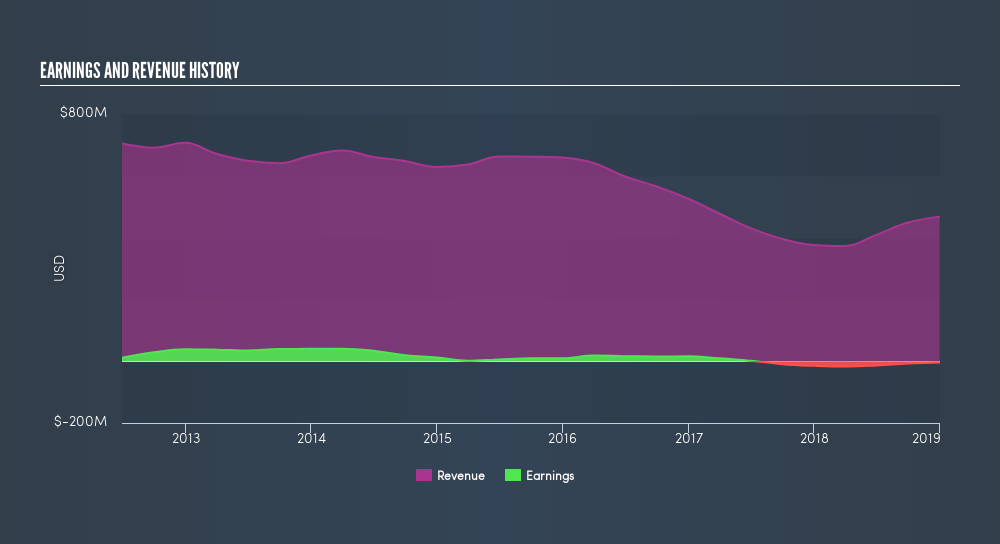- United States
- /
- Electrical
- /
- NasdaqGS:POWL
Did Changing Sentiment Drive Powell Industries's (NASDAQ:POWL) Share Price Down A Worrying 54%?

Want to participate in a short research study? Help shape the future of investing tools and you could win a $250 gift card!
Ideally, your overall portfolio should beat the market average. But even the best stock picker will only win with some selections. So we wouldn't blame long term Powell Industries, Inc. (NASDAQ:POWL) shareholders for doubting their decision to hold, with the stock down 54% over a half decade. There was little comfort for shareholders in the last week as the price declined a further 2.5%.
Check out our latest analysis for Powell Industries
Powell Industries isn't a profitable company, so it is unlikely we'll see a strong correlation between its share price and its earnings per share (EPS). Arguably revenue is our next best option. Shareholders of unprofitable companies usually expect strong revenue growth. As you can imagine, fast revenue growth, when maintained, often leads to fast profit growth.
Over half a decade Powell Industries reduced its trailing twelve month revenue by 12% for each year. That puts it in an unattractive cohort, to put it mildly. Arguably, the market has responded appropriately to this business performance by sending the share price down 14% (annualized) in the same time period. We don't generally like to own companies that lose money and don't grow revenues. You might be better off spending your money on a leisure activity. This looks like a really risky stock to buy, at a glance.
The graphic below shows how revenue and earnings have changed as management guided the business forward. If you want to see cashflow, you can click on the chart.

If you are thinking of buying or selling Powell Industries stock, you should check out this FREEdetailed report on its balance sheet.
What About Dividends?
When looking at investment returns, it is important to consider the difference between total shareholder return (TSR) and share price return. The TSR is a return calculation that accounts for the value of cash dividends (assuming that any dividend received was reinvested) and the calculated value of any discounted capital raisings and spin-offs. It's fair to say that the TSR gives a more complete picture for stocks that pay a dividend. We note that for Powell Industries the TSR over the last 5 years was -46%, which is better than the share price return mentioned above. And there's no prize for guessing that the dividend payments largely explain the divergence!
A Different Perspective
Powell Industries shareholders are down 2.7% for the year (even including dividends), but the market itself is up 10%. Even the share prices of good stocks drop sometimes, but we want to see improvements in the fundamental metrics of a business, before getting too interested. Unfortunately, longer term shareholders are suffering worse, given the loss of 12% doled out over the last five years. We'd need to see some sustained improvements in the key metrics before we could muster much enthusiasm. Keeping this in mind, a solid next step might be to take a look at Powell Industries's dividend track record. This freeinteractive graph is a great place to start.
We will like Powell Industries better if we see some big insider buys. While we wait, check out this freelist of growing companies with considerable, recent, insider buying.
Please note, the market returns quoted in this article reflect the market weighted average returns of stocks that currently trade on US exchanges.We aim to bring you long-term focused research analysis driven by fundamental data. Note that our analysis may not factor in the latest price-sensitive company announcements or qualitative material.
If you spot an error that warrants correction, please contact the editor at editorial-team@simplywallst.com. This article by Simply Wall St is general in nature. It does not constitute a recommendation to buy or sell any stock, and does not take account of your objectives, or your financial situation. Simply Wall St has no position in the stocks mentioned. Thank you for reading.
About NasdaqGS:POWL
Powell Industries
Designs, develops, manufactures, sells, and services custom-engineered equipment and systems.
Flawless balance sheet with solid track record.
Similar Companies
Market Insights
Community Narratives



